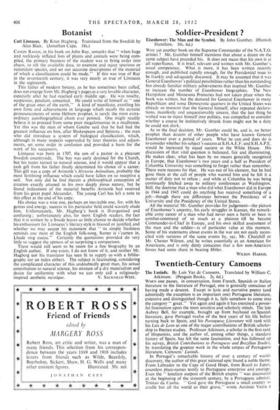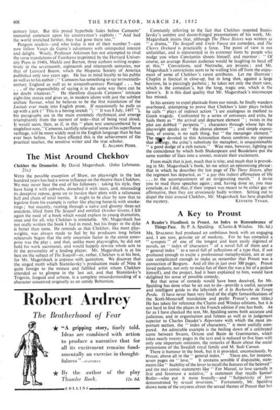Twentieth-Century Camoens
The Lusiads. By Luis Vaz de Camoens. ' Translated by William C. Atkinson. (Penguin Books. 2s. 6d.)
WHEN one passes, in conyersation, from French, Spanish or Italian literature to the literature of Portugal, one is generally conscious of having made a descent. Except in lyric and narrative poetry (and admittedly the exception is an important one) Portuguese literature, extensive and distinguished though it is, fails somehow to come into the category " great." Yet again and again it has exercised a power- ful fascination upon the most sensitive and scholarly minds. The late Aubrey Bell, for example, brought up from boyhood on Spanish literature, gave Portugal twelve of the best years of his life before turning back to Spain, and his Portuguese „Literature will rank with his Luis de Leon as one of the major contributions of British scholar- ship to Iberian studies. Professor Atkinson, a scholar in the first rank of Hispanists, and the author of, among other things, a standard history of Spain, has felt the same fascination, and has followed up his survey, British Contributions to Portuguese and Brazilian Studies, by translating the greatest work in the whole corpus of Portuguese literature, Camoens' Lusiads.
In Portugal's remarkable history of over a century of world- discovery, the author of this great national epic found a noble theme. From Labrador to the Cape of Good Hope, from Brazil to Japan, countless place-names testify to Portuguese enterprise and courage. Even the " loneliest outpost of the British empire " was discovered at the beginning of the sixteenth century, by a Portuguese admiral, Tristao da Cunha. " God gave the Portuguese a small country as cradle but all the world as their grave," wrote Antonio Vieira a century later. But this proud hyperbole fades before Camoens' immortal comment upon his countryman's exploits : "And had the world stretched farther, they had gone there too."
Penguin readers—and who today is not of their number ?—can now follow Vasco da Gama's adventures with unimpeded interest and delight. Wisely, Professor Atkinson has not attempted to rival the verse translations of Fanshawe (reprinted by the Harvard Univer- sity Press in 1940), Mickle and Burton, three authors writing respec- tively in the seventeenth, eighteenth and nineteenth centuries, nor that of Leonard Bacon, which the Hispanic Society of America published only two years ago. He has in mind loyalty to his public as well as to his author : " Camoens has something so say to twentieth- century England as well as to sixteenth-century Portugal . . . but . . . of the impossibility of saying it in the same way there can be no doubt whatever." He therefore discards Camoens' intricate eight-line stanza and gives us, in modern idiom with just the subtlest archaic flavour, what he believes to be the first translation of the Lusiads ever made into English prose. If occasionally he pulls us up with a jerk (" This is a boring stretch "; " It was 8 July, 1497 "), his paragraphs are in the main extremely rhythmical, and emerge triumphantly from the sternest of tests—that of being read aloud. It would seem, then, as if, in this "plain text unencumbered by a singlefoot note," Camoens, tactfully relieved of some of his superfluous verbiage, will be more widely read in the English language than he has ever been before. To have effected this is the achievement of the practical teacher, the sensitive writer and the true scholar.
E. ALLISON PEERS.



































 Previous page
Previous page